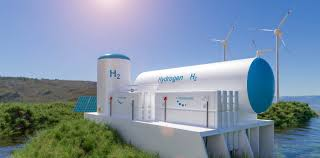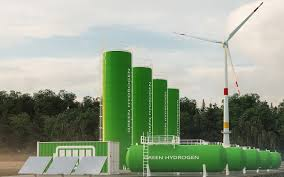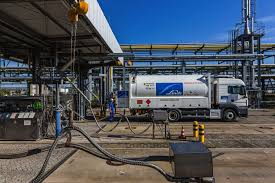Now Reading: “Why Hydrogen Power Could Be the Future of Energy and Transport 2025!”
-
01
“Why Hydrogen Power Could Be the Future of Energy and Transport 2025!”
“Why Hydrogen Power Could Be the Future of Energy and Transport 2025!”

Table of Contents
In a world searching for clean and renewable energy sources, hydrogen fuel is fast becoming a serious player in the race to replace fossil fuels. As countries and companies invest billions into hydrogen technology, many experts believe this could be the solution to the global energy crisis.
So what exactly is hydrogen fuel, and why is the world so excited about its future? Let’s find out.
What Is Hydrogen Fuel?

Hydrogen is the most abundant element in the universe. It’s found in water (H₂O), plants, and even in our own bodies. When hydrogen is used as a fuel, it produces energy through a chemical reaction rather than burning. The best part? The only by-product is pure water vapor. No harmful carbon dioxide (CO₂), no pollution.
This clean process makes hydrogen fuel one of the most eco-friendly energy sources known today.
Why Is Hydrogen Fuel So Important?
- Reduces Air Pollution:
Traditional fuels like petrol, diesel, and coal release carbon emissions that pollute the air and contribute to climate change. Hydrogen fuel does not release CO₂ or other harmful gases, making it a cleaner option. - Abundant and Renewable:
Unlike oil or gas, hydrogen is available almost everywhere. It can be produced using renewable resources like solar and wind energy. This means countries can reduce their dependence on oil imports and develop local energy sources. - Versatile Uses:
Hydrogen fuel isn’t just for cars. It can power buses, trucks, trains, ships, and even airplanes. Some companies are also exploring hydrogen fuel for heating homes and running factories. - Energy Storage Solution:
One big problem with solar and wind energy is that they don’t always produce power when needed (for example, no solar energy at night). Hydrogen can store energy produced from these sources and release it when required. This makes hydrogen a perfect partner for renewable energy systems.
What Are the Challenges?
While hydrogen fuel sounds perfect, there are still some hurdles to cross before it becomes a mainstream energy source.
- Production Cost:
Currently, making hydrogen fuel (especially “green hydrogen” made from renewable energy) is expensive. Most hydrogen today is produced from natural gas, which is not fully clean. To reach a sustainable hydrogen economy, green hydrogen must become cheaper. - Storage and Transportation:
Hydrogen is the lightest gas, which makes it tricky to store and transport. It needs special tanks and infrastructure, which can add to costs. - Safety Concerns:
Because hydrogen is highly flammable, safety systems must be designed carefully. However, experts say these risks can be managed, much like with gasoline or natural gas.
Global Efforts to Embrace Hydrogen

Countries around the world are now planning to make hydrogen a key part of their energy strategy.
- European Union:
The EU has announced ambitious plans to make Europe the world leader in hydrogen fuel by 2030. Billions of euros are being invested into green hydrogen plants. - Japan and South Korea:
These countries are leading in hydrogen car technology. Toyota and Hyundai already sell hydrogen-powered vehicles. Japan even used hydrogen fuel cells to power parts of the Tokyo 2020 Olympic Games. - United States:
The U.S. government has announced funding for hydrogen projects as part of its goal to reach net-zero emissions by 2050. - India:
India is also stepping into the hydrogen future. The country launched its National Green Hydrogen Mission in 2023 to reduce dependence on fossil fuels.
Companies Betting Big on Hydrogen

Big companies are not far behind. Major names like Shell, BP, Toyota, Hyundai, and Tesla are investing in hydrogen technology. Even Airbus, the airplane maker, has promised to launch hydrogen-powered aircraft by 2035.
In the trucking industry, companies like Nikola and Hyundai are developing hydrogen trucks that can travel long distances without harmful emissions.
The Hydrogen Fuel Market is Growing Fast
According to research reports, the global hydrogen market is expected to grow to $300 billion by 2030. This growth is driven by the rising demand for clean energy and strict environmental laws worldwide.
Countries with rich renewable energy sources (like wind in Denmark or solar in Saudi Arabia) are looking to produce green hydrogen for both local use and export.
Is Hydrogen Fuel the Future of Energy?
The future of hydrogen fuel looks bright—but it depends on how fast the world can solve its challenges. Lowering the cost of green hydrogen, building new infrastructure, and ensuring safety will decide how soon hydrogen replaces fossil fuels.
One thing is certain: as the world moves toward zero emissions, hydrogen will play a major role in powering cars, industries, and homes. Experts believe that within the next 20 years, hydrogen could make up 20% or more of the global energy market.
Final Thoughts
Hydrogen fuel may not yet be everywhere, but its future looks promising. Governments, businesses, and researchers are working hard to make hydrogen energy affordable, safe, and available for everyone. If they succeed, we may soon live in a world where clean hydrogen powers our cities, transports, and industries—helping to save the planet for future generations.
For now, the hydrogen revolution has just begun.
Read More:- Shobha Realty Launches Its Most Luxurious Project Yet—Full Details Inside 2025






















